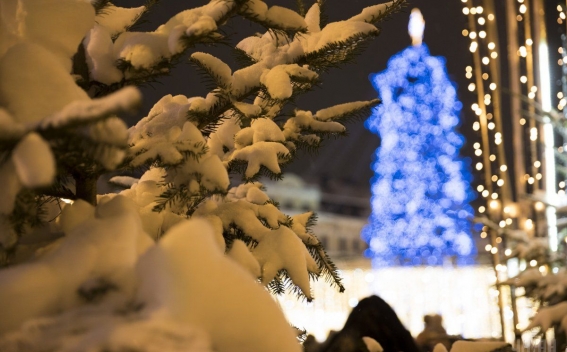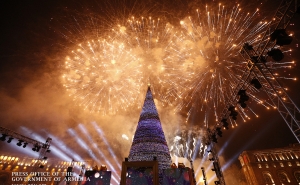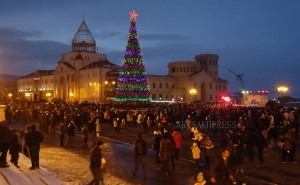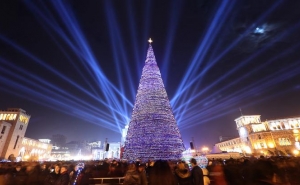The Old New Year

The Orthodox New Year, also known as the Old New Year, according to the Julian calendar is on January 14 in the Gregorian calendar. The Julian calendar pre-dates the Gregorian calendar.
Many Orthodox Christians who observe the New Year’s Day date from the Julian calendar may spend the day reflecting on the previous year and think about meaningful resolutions for the New Year. Many people celebrate the day with family or friends to welcome the New Year. Activities may include fireworks, large meals and music entertainment.
Some churches hold Orthodox New Year events such as parties or dinners. Those who attend these events may pray for the New Year and toast their drinks. Some churches host gala dinners to raise funds for charitable causes or church building restorations.
The Orthodox New Year is not a federal public holiday but it may be a regional or non-official holiday limited to regional areas or religious groups in countries such as Bosnia and Herzegovina, Georgia, Russia, and the Ukraine. The Orthodox New Year is observed among Orthodox Christians in countries such as Australia, Canada, the United Kingdom and the United States.
The Orthodox New Year is widely known as the Old New Year. It is marked as January 1 in the Julian calendar, which was used before the Gregorian calendar. Some countries, including Italy, Poland, Portugal, and Spain, accepted the Gregorian calendar’s introduction in 1582. The conversion took longer for other countries such as Great Britain (1752) and Greece (1923). A number of days were omitted when the Gregorian calendar was instroduced. For example, England and Scotland dropped 11 days for the conversion. Some communities did not accept the loss of these days and preferred to use the Julian calendar.
Many Orthodox churches still recognize the holiday dates according to the Julian calendar. The Orthodox New Year does not remain static in the Gregorian calendar because there are shifts between the Julian and Gregorian calendars over time. For example, the Old New Year falls on January 14 between 1901 and 2100 but it will move again in time if the Julian calendar is still used.
The Julian calendar was revised in 1923 and this version is more in line with the Gregorian calendar. Some Orthodox churches follow the revised Julian calendar but many Orthodox churches still follow the more traditional Julian calendar, which has the original dates for Christian observances prior to the Gregorian calendar’s introduction. Also, the Orthodox New Year must not be confused with the start of the Eastern Orthodox liturgical calendar, which traditionally begins on September 1.
The Orthodox New Year has been symbolized or mentioned in various Eastern European art, including Russian art and literary works. For example, a comedy drama called The Old New Year, written by playwright Mikhail Roshchin in 1973, was featured in theatres before it became a screenplay for television film.
Other materials on this subject
- How to Make a Glint-wine? Cheer Up Yourself with This Warm Delicious Beverage The secret to getting a great Glühwein is the right mixture of red wine, cinnamon sticks, sugar, oranges and cloves. Follow this simple recipe to conjure up a touch of winter magic in your own kitchen.
- Happy New Year, Dear "Armedia" IAA Readers! We wish a year without war, a year of stability, a year of progress and development.
- Cumberbatch Leads a Masterclass How to Accept Bad Presents Benedict Cumberbatch leads an acting Masterclass to teach you how to act like you ‘love love’ the long underwear your auntie gave you!
- If You Want to Spend Eco-New Year, Visit Artsakh So if one wants to spend an unforgettable time at New Year, it is highly recommended to visit Artsakh! This will be the most eco-New Year in your life!
- Father Ghevond Mayilyan: Christ Left the Heavens and Descended into the Earth for Us, Bringing Salvation and Life In various countries and at different times, in order to detract the meaning of Christ's Birth, they tried to replace it with New Year celebrations.
-
 17:08
17:08The regular session of the Anti-corruption Policy Council takes place in Jermuk
-
 15:05
15:05The Prime Minister sends congratulatory messages to the supreme leader of Iran and the President of Iran
-
 11:11
11:11Armenia sends earthquake aid to Turkey
-
 10:43
10:43Commemoration of the Pontiff St. Sahak Partev
-
 09:16
09:16Some roads are closed and difficult to pass in Armenia
-
 19:55
19:55Phone conversation of the Foreign Minister of Armenia with the U.S. Assistant Secretary of State for European and Eurasian Affairs
-
 18:30
18:30Prime Minister Pashinyan and President Khachaturyan meet
-
 18:20
18:20Ararat Mirzoyan with Co-Chairman of the OSCE Minsk Group of France Brice Roquefeuil
-
 17:01
17:01Humans could land on Mars within 10 years, Musk predicts
-
 16:45
16:45France, US urge 'immediate' end to Nagorno Karabakh blockade
-
 16:01
16:01Blockaded Nagorno Karabakh launches fundraiser to support quake-hit Syria
-
 15:59
15:59Earthquake death toll in Turkey rises to 18,342
-
 15:43
15:43Ararat Mirzoyan Held a Telephone Conversation with Sergey Lavrov
-
 15:06
15:06French president rules out fighter jet supplies to Ukraine in near future
-
 14:47
14:475 Day Weather Forecast in Armenia
-
 14:44
14:44President Vahagn Khachaturyan wrote a note in the book of condolences opened in the Embassy of Syria in Armenia
-
 14:20
14:20Azerbaijan’s provocations impede establishment of peace and stability – Armenian FM tells Russian Co-Chair of OSCE MG
-
 12:57
12:57France representation to OSCE: Paris calls on Azerbaijan to restore freedom of movement through Lachin corridor
-
 11:40
11:40Command of Kosovo forces highly appreciated preparation of Armenian peacekeepers
-
 10:16
10:16The United States withdrew from sanctions against Syria for six months the provision of assistance after the earthquake
day
week
month
Humidity: %
Wind: km/h









